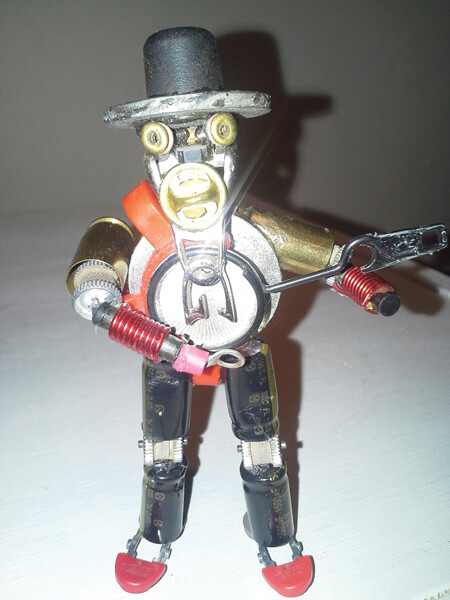Glue and Garbage: Bozeman Man Turns Trash into Treasure
Living in Montana makes it easy to forget just how much waste the U.S. population generates every year. Our rivers are pristine, our mountains are clean, and the air we breathe is free of smog. However, in 2014, over 41 million metric tons of electronic waste were created, and the U.S. was the largest contributor to that number. According to Causes International, this is enough waste to fill more than one million semi-trucks, which would stretch from New York City to Tokyo and back again if lined up. Four Corners resident Ed Brumitt is using his artistic talents to repurpose some of that waste.
He started tinkering with electronic waste about ten years ago. He had a VCR that was headed for the dump, but he felt badly about throwing it away. Instead, he broke it down into pieces and used those pieces to create a small figurine. “I got bored and just started basically gluing garbage together,” Brumitt explained. This moment of boredom inspired years of tinkering exclusively with garbage that he finds around town.

Unfortunately, Brumitt never experiences a shortage in supplies. U.S. residents spend billions of dollars on consumer electronics every year, and the majority of these items end up in landfills despite e-waste recycling efforts. Many electronic items, including cell phones, contain precious metals like gold and silver. Each year, U.S. residents throw away over $60 million in precious metals by throwing away their electronics, according to DoSomething.org. Brumitt takes this trash and converts it into treasure.
He finds old batteries and trinkets while walking his dog. Friends give him their old electronics and he is always accepting donations. He turns all this garbage into whatever inspires him. He is careful with his supplies because many electronics contain toxic elements. In fact, electronic waste accounts for 70% of the toxic waste that takes up space in U.S. landfills, according to DoSomething.org.
Typically, Brumitt finds something and it speaks to him in a way. He takes his creative direction from the items he collects. He puts everything he gathers on a deli tray and, when he’s not working, experiments with different pieces and how they might work together.
With these items, he creates small figurines that look like people, dogs, and many other things. Batteries become legs, wires become whiskers, and bolts become eyes. His favorite creation is a motorcycle he made several years ago. His tray was excessively cluttered, so he dumped everything out and went to work putting things together in a way that made sense. He uses a pliable and strong glue to attach everything and the result is fantastic.
Brumitt shies away from calling himself an environmentalist, but he is clear on the fact that he does not like to make a mess. “I try to recycle everything I can,” he explained. He used to own a silk screening business and felt as though he was filling up landfills more than one individual should. Watching paint wash down the drain was disconcerting, and he often made t-shirts for groups he knew would simply wear the shirt once and then eventually throw it away. This bothered him and instilled in him a desire to use or recycle everything he could.
Currently, Brumitt does not sell his creations. He typically gives them as gifts. Right now, he is working on a bicycle figurine for a bike shop in Big Sky. Money is not what motivates him. His motivation comes from breathing new life into items destined for landfills. He may decide to sell some of his creations someday, but he finds that he gets attached to what he makes. At this point, he is content knowing he’s taken some garbage out of his neighborhood and repurposed it into something that others can enjoy.
You don’t have to be artistic like Brumitt to limit the amount of garbage you send to the landfill. Look for local e-waste recycling events before you dispose of old electronics. National groups like Shelter Alliance and the National Coalition Against Domestic Violence, and local group Haven accept used cell phones and electronics and distribute them to victims of domestic violence.
Electronic waste isn’t the only waste that can be reused or recycled. Montana State University’s Extension office provides lots of information on how to compost food waste at home. Food waste takes a long time to break down in landfills because oxygen is limited. However, in your backyard garden, food waste will break down quickly and enrich the soil.
The Gallatin Solid Waste Management District [GSWMD] recycling program has bins all over town to collect your cardboard, paper, aluminum, steel, and plastic. According to its website, the company has collected more than 4,850 tons of recyclable material in our area, which is an excellent start. We can reduce the amount of fuel and energy that it takes to recycle these materials by reusing what we can at home. So, the next time you are walking your dog, look around and see what you can find. There just might be some trash that someone else tossed on the ground, and with a little imagination, it could become your treasure.
